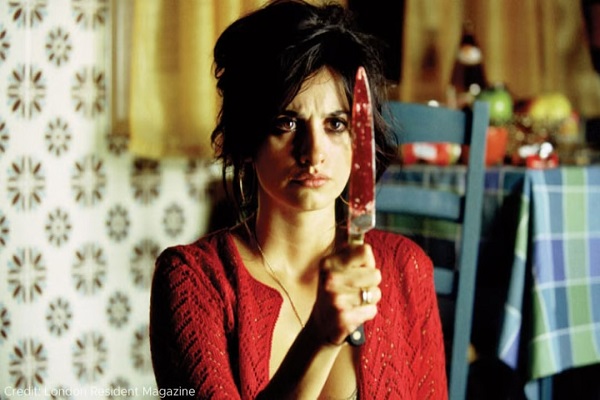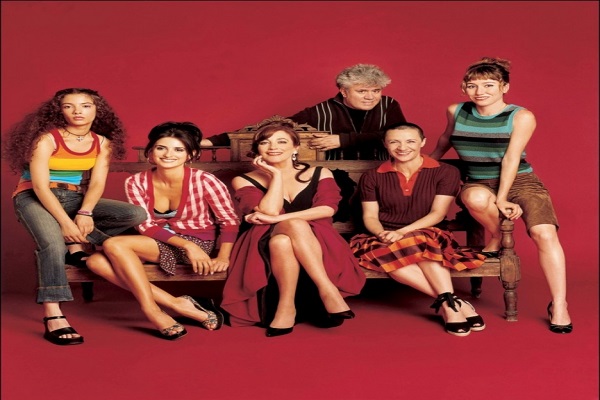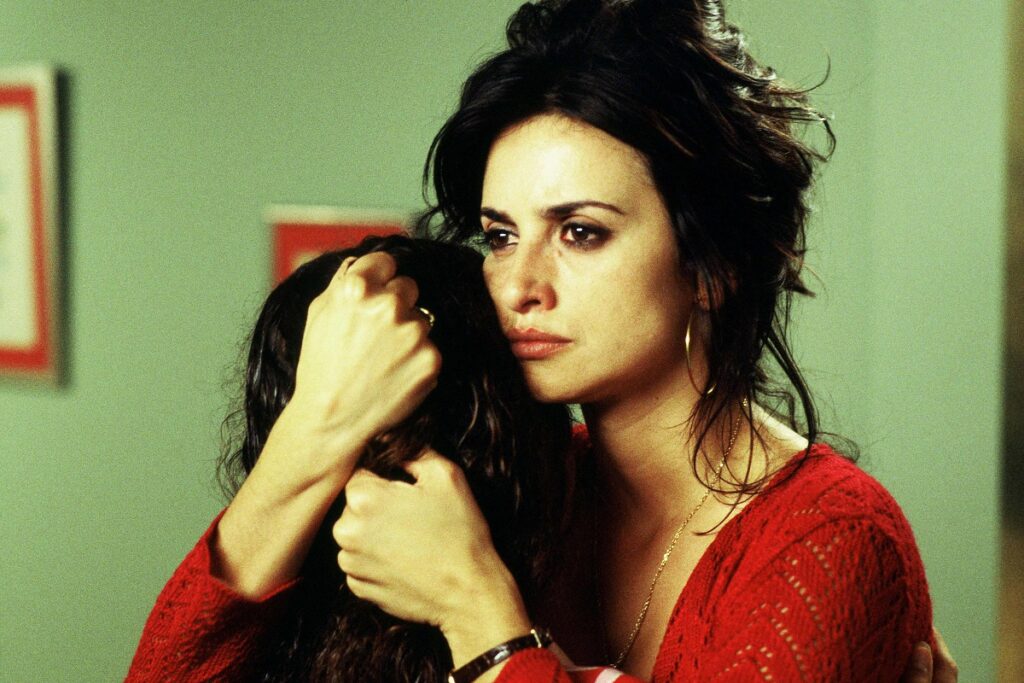In Volver, Spanish master Pedro Almodovar pays a heartfelt tribute to his motherland La Mancha, his mother, the women who raised him, and all the women in general. Almodovar always portrays women in a positive light with much importance and significance. Volver is not an exception. However, he vilifies the male characters here. Fighting the evil male figures, the women become triumphant. So, this is a story of the women who get tormented but emerge victorious. Even though it looks like a melodrama, Volver has multiple layers underneath it. It deals with utterly serious and dark subjects like rape, murder, torture of women, sexual assault, adultery, and vengeance. Almodovar also infuses a touch of magic realism into the film. However, despite the dark subjects, the film is also incredibly enriched with a touch of comedy. Volver means ‘to return’. Overall, filmmaker Pedro Almodovar returns to his roots through this film.
The film starts in a small windy Spanish village named Alcanfor de las Infantas in the La Mancha region of Spain. Multiple women are seen washing the headstones and graves of their husbands and relatives. Women here generally outlive their husbands. Two sisters Raimunda (Penelope Cruz) and Sole (Lola Duenas) live in Madrid and lost their parents in a fire accident three years back. Raimunda has a fourteen-year-old daughter named Paula (Yohana Cobo). Raimunda’s beer-addicted and now jobless husband Paco (Antonio de la Torre) tries to rape Paula who kills Paco by stabbing in self-defense. Raimunda can’t believe this incident, gets shocked and agonized, and hides Paco’s body in a freezer kept in Emilio’s restaurant nearby. A film crew manager offers her the job to cook for them which she gladly accepts.

Aunt Paula passes away. Sole returns to La Mancha for her funeral and encounters the ghost of her mother Irene (Carmen Maura). She folds herself in the dicky of Sole’s car and reaches Madrid. Sole learns that she was not killed in the fire accident and her existence is very much real. She allows her to stay with her and work in her illegal Salon.
Raimunda reveals to Paula that Paco is not her biological father. Aunt Paula’s neighbor Agustina (Blanca Portillo), who used to look after her, develops terminal cancer and comes to Madrid for treatment. Raimunda visits her at the hospital when she asks Raimunda whether she has seen her mother’s ghost and only the ghost will be able to tell correctly about her mother. Raimunda hires a van, keeps Paula with Sole, takes the freezer into the van, and then travels to the Jucar River. She buries the freezer containing Paco’s dead body in a suitable spot on the bank of the river where Paco used to play in his childhood. Agustina visits Raimunda’s restaurant and reveals two secrets; her mother was having an affair with Raimunda’s father, and she disappeared on the same day Raimunda’s parents died in the fire accident.
Sole and Raimunda’s mother Irene reveals the truth to them. She did not die in that fire accident. Her husband and Agustina’s mother had an affair. She set the house on fire when they were having sex in that house killing them both in that accident. She roamed around in the neighborhood for the next few days and then got shelter in Aunt Paula’s house. She was terrified of the police but they never appeared there. Some villagers saw her a few times and spread the ghost story. Irene has been taking care of her sister Paula since then.
Irene reveals the truth to Agustina as well. As Agustina’s cancer worsens, Irene promises to take care of her from now onwards, and that’s the least she can do for her after killing her mother. Raimunda visits them in Agustina’s house. Irene and Raimunda commit to mend their relationship.
In Spanish, Volver means to return or come back. Through this film, Almodovar returns to his roots. He returns to his birthplace La Mancha, and wholeheartedly acknowledges the contributions of all the incredible women to his life. He generally pays tribute to women who sacrifice so much for us. Through tough fights and life struggles, they emerge as the winner. Almodovar shows his heartfelt gratitude to all those tough and incredible women. Multiple times, he has acknowledged the contributions of women to his life more than men. So, his films always portray the significance and importance of women in society and also across the world. Volver is largely inspired by his own life. So, quite naturally, it is deeply influenced by the women who raised Almodovar. Through Volver, he returns to his past life and cherished memories. Also, through Volver, he returns to work with two incredible actresses Carmen Maura and Penelope Cruz after 18 years and 7 years.
The title of the film Volver is inspired by the tango Volver by Carlos Gardel. In the film, Irene taught this tango to Raimunda in her childhood. So, when she sings this in the restaurant, Irene listens to this being hidden but feels utterly elated and emotional that she, still, has not forgotten it after so many years.

Almodovar deeply loves the red color. Volver is not an exception. Red is an intense and expressive color and signifies love, passion, fire, and overall life. It also enriches the night scenes with more brightness. So, Almodovar uses red clothes like sweaters and cardigans for his actresses in the night scenes. Red color also enhances natural beauty. So, he uses red cars while his actors drive through the countryside.
In Volver, Almodovar stages a strong but silent protest against Francoist Spain and Spanish patriarchy without any direct reference. During Franco’s regime, Spanish women were subjected to various tortures like rapes, murders, sexual abuse, and physical assaults. They were oppressed day in and day out. Almodovar possesses an extreme affinity for women. So, he got rid of Francoist Spain as if it did not do any good for the country. It simply did not exist at all. So, it is no surprise that the male characters in Volver are vilified. Raimunda’s father gets her pregnant. Paco tries to rape his stepdaughter Paula. However, the women here are strong enough and independent. So, the male abusers are aptly punished. Paula stabs Paco to death. Irene set the house on fire when her husband was having sex with Agustina’s mother. However, these women are not broken without their male partners. Raimunda runs her livelihood by working as a janitor and sometimes a cook. Sole is divorced and runs a salon. Almodovarian women are strong enough to take care of themselves.
Pedro Almodovar is the master of melodrama. However, he does not infuse emotions forcibly. He does not build up arbitrary plotlines just for the sake of making films. His films are largely inspired by his own life. Almodovar brings his own life stories into his films. So, his films are deeply personal melodramas that have multiple layers and elements from his own life. The plot lines of his films are complex. It starts with a note of comedy when a group of women are cheerfully washing the graves of their husbands and family members in a small windy Spanish village. Then, the film goes through multiple dark incidents like rape, murder, sexual abuse, divorce, and adultery. Sometimes, it seems to be a film about death. The women wash the headstones and graves of their husbands. Paula kills her stepfather in self-defense. Irene killed her husband and Agustina’s mother three years back. Aunt Paula passes away after suffering from dementia for quite a few years. So, the film is based on the premise of death. However, the mastery of Almodovar lies in bringing light comedies even in the darkest incidents like death. Death cannot destroy his incredibly powerful women. Overcoming numerous obstacles and traumas, they emerge triumphant.
One of the most important aspects of Volver is the melodramatic screenplay written by Almodovar himself. In the screenplay, multiple serious and dark layers are woven together with a blend of comedy. Almodovar’s own life experiences are reflected in the screenplay. The more the film progresses more it becomes complex. Through this film, Carmen Maura and Penelope Cruz return to work with Almodovar after 18 and 7 years. Cruz delivers an outstanding performance as Raimunda. Even though the film has an ensemble cast, Cruz is everywhere and this film belongs to her. Miseries of Spanish women are reflected in her facial expressions. Carmen Maura excels in Irene’s character. Raw emotions come out of her while reconciling with her daughter Raimunda. Lola Duenas justifies her character as Sole.
Apart from Almodovar’s multi-layered screenplay, another striking phenomenon of Volver is Jose Luis Alcaine’s incredibly dynamic and magnificent cinematography. He uses rich colors and bright lights throughout the film. It looks like the film is a cinematic extravaganza. Alcaine’s camera dynamically captures Paco’s murder. The camera is at eye level during Paula’s confession to her mother Raimunda. But, it moves up very high when Raimunda washes the knife in the basin. The camera is static and patient while Raimunda buries Paco on the bank of the Jucar River. Alcaine’s camera always follows the characters and tries to reveal the deeply hidden secrets. Overall, Volver is an incredibly well-made film.
Another pillar of Volver is Alberto Iglesias’ brilliant music. Almodovar has a very long association with Iglesias. He understands Almodovar’s concepts in detail. So, it is no surprise that Iglesias creates outstanding pieces of music in Almodovar’s films. Instead of purely sentimental music, Almodovar always prefers music that enriches the story and helps it to flow smoothly. So, in Volver also, the music flows neither up nor down, but parallel to dialogues. It gets assimilated into the film incredibly effortlessly. In the film, Almodovar uses Carlos Gardel’s tango song Volver which is sung by Estrella Morente and lip-synced by the character Raimunda played by Penelope Cruz. However, Almodovar changes the tango song to Flamenco. So, it embodies a powerful Spanish flavor much like Almodovar’s films like Volver.
Other significant works in the film are make-up and hairstyling. Almodovar wanted to use prosthetics for Penelope Cruz’s back in the way Spanish middle-aged women would look in the early 1980s. He also used back-brushed hair for Cruz. Through effective make-up and hairstyling, the actresses in the film largely resemble the Spanish women of the 1980s. Overall, Almodovar paints Volver with the colors from his own life.
